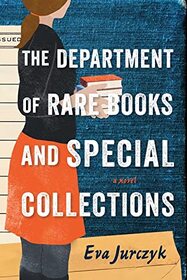Helpful Score: 1
The Department of Rare Books and Special Collections comes alive when describing precious manuscripts and the donors that make their appearance on university library shelves possible. The characters, on the other hand, don't shine nearly as brightly.
Liesl Weiss has spent so many years working in the shadows behind unreliable men that she tends to be gray and lackluster-- except when she fights to protect a fellow librarian's reputation. Each time she tries to do the right thing, especially when it involves having the police brought in to find the thief and the missing book, she's slapped down. The university president would rather whitewash everything that might make the donors unhappy.
It doesn't take much to deduce who is responsible for the missing book. No, what I am taking away from Jurczyk's book is her decidedly jaundiced view of donors. Of how much time must be spent in massaging their fragile egos. Of how a university's infrastructure can be geared toward reaping donor money than it is to keep the buildings themselves standing. Of how, when one university went so far past its goals it had to tear down a perfectly good building and build a new one rather than spend the extra money on badly needed maintenance and other programs because, well, everyone knows how donors love to see their names plastered all over buildings. As you can see, my own view of rich donors tends to be a bit jaundiced, too.
As a mystery, The Department of Rare Books and Special Collections is relatively easy to solve. As a character study, it's done in varying shades of gray. But come to life it does when describing wonderful old books and what must be done in order to have them on a university's shelves. I'm glad I spent some time with Liesl Weiss. She and I see eye-to-eye on many things.
(Review copy courtesy of the publisher and Net Galley)
Liesl Weiss has spent so many years working in the shadows behind unreliable men that she tends to be gray and lackluster-- except when she fights to protect a fellow librarian's reputation. Each time she tries to do the right thing, especially when it involves having the police brought in to find the thief and the missing book, she's slapped down. The university president would rather whitewash everything that might make the donors unhappy.
It doesn't take much to deduce who is responsible for the missing book. No, what I am taking away from Jurczyk's book is her decidedly jaundiced view of donors. Of how much time must be spent in massaging their fragile egos. Of how a university's infrastructure can be geared toward reaping donor money than it is to keep the buildings themselves standing. Of how, when one university went so far past its goals it had to tear down a perfectly good building and build a new one rather than spend the extra money on badly needed maintenance and other programs because, well, everyone knows how donors love to see their names plastered all over buildings. As you can see, my own view of rich donors tends to be a bit jaundiced, too.
As a mystery, The Department of Rare Books and Special Collections is relatively easy to solve. As a character study, it's done in varying shades of gray. But come to life it does when describing wonderful old books and what must be done in order to have them on a university's shelves. I'm glad I spent some time with Liesl Weiss. She and I see eye-to-eye on many things.
(Review copy courtesy of the publisher and Net Galley)




